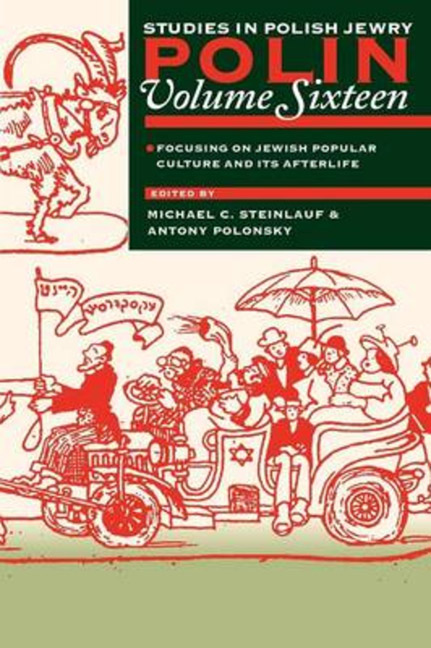Book contents
- Frontmatter
- Dedication
- Editors and Advisers
- Preface
- Polin
- Polin: Studies in Polish Jewry
- Contents
- Note on Place Names
- Note on Transliteration
- PART I JEWISH POPULAR CULTURE IN POLAND AND ITS AFTERLIFE
- IN PRE-WAR POLAND
- The Badkhn: From Wedding Stage to Writing Desk
- Remembrance of Things Past: Klezmer Musicians of Galicia, 1870–1940
- Early Recordings of Jewish Music in Poland
- Jewish Theatre in Poland
- A Tuml in the Shtetl: Khayim Betsalel Grinberg's Di khevre-kedishe sude
- Mordechai Gebirtig: The Folk Song and the Cabaret Song
- Simkhe Plakhte: From ‘Folklore’ to Literary Artefact
- Between Poland and Germany: Jewish Religious Practices in Illustrated Postcards of the Early Twentieth Century
- Papers for the Folk: Jewish Nationalism and the Birth of the Yiddish Press in Galicia
- Shund and the Tabloids: Jewish Popular Reading in Inter-War Poland
- Dos yidishe bukh alarmirt! Towards the History of Yiddish Reading in Inter-War Poland
- Exploiting Tradition: Religious Iconography in Cartoons of the Polish Yiddish Press
- AFTERLIFE
- PART II DOCUMENTS
- PART III NEW VIEWS
- PART IV REVIEWS
- REVIEW ESSAYS
- BOOK REVIEWS
- CORRESPONDENCE
- OBITUARIES
- Notes on the Contributors
- Glossary
- Index
Jewish Theatre in Poland
from IN PRE-WAR POLAND
- Frontmatter
- Dedication
- Editors and Advisers
- Preface
- Polin
- Polin: Studies in Polish Jewry
- Contents
- Note on Place Names
- Note on Transliteration
- PART I JEWISH POPULAR CULTURE IN POLAND AND ITS AFTERLIFE
- IN PRE-WAR POLAND
- The Badkhn: From Wedding Stage to Writing Desk
- Remembrance of Things Past: Klezmer Musicians of Galicia, 1870–1940
- Early Recordings of Jewish Music in Poland
- Jewish Theatre in Poland
- A Tuml in the Shtetl: Khayim Betsalel Grinberg's Di khevre-kedishe sude
- Mordechai Gebirtig: The Folk Song and the Cabaret Song
- Simkhe Plakhte: From ‘Folklore’ to Literary Artefact
- Between Poland and Germany: Jewish Religious Practices in Illustrated Postcards of the Early Twentieth Century
- Papers for the Folk: Jewish Nationalism and the Birth of the Yiddish Press in Galicia
- Shund and the Tabloids: Jewish Popular Reading in Inter-War Poland
- Dos yidishe bukh alarmirt! Towards the History of Yiddish Reading in Inter-War Poland
- Exploiting Tradition: Religious Iconography in Cartoons of the Polish Yiddish Press
- AFTERLIFE
- PART II DOCUMENTS
- PART III NEW VIEWS
- PART IV REVIEWS
- REVIEW ESSAYS
- BOOK REVIEWS
- CORRESPONDENCE
- OBITUARIES
- Notes on the Contributors
- Glossary
- Index
Summary
IN PRE-MODERN TIMES
TRADITIONAL Judaism, as frequently noted, is less concerned with doctrine than with practice. The practice is defined by Jewish law, halakhah. Originating in the Talmud, adapted by religious authorities from generation to generation for 1,500 years, halakhah (along with the associated system of minhag, or custom) made it possible for Jews to maintain an absolute distinction between Jewish and non-Jewish ways of doing nearly everything in life. Halakhah, in other words, is a kind of script for the observance of traditional Jewish life, and this life was richly performative. This was obviously true of the complex liturgy of the synagogue, but it also applied to the Jewish home, where sabbath meals and Passover seders were only the more obvious examples of densely detailed, carefully enacted ritual performances, and it also applied to the Jewish life cycle. All such ritual, whether part of the life cycle, the annual cycle, or daily life, was also linked to music, above all to the chanted melody, or nign. The taking of wedding vows, the benediction over food, the burial of the dead, the study of Torah, and countless other activities were all performed to characteristic nigunim: moreover, everyday Jewish conversation and gesture were punctuated with nigunim and cannot be imagined without them.
The centrality of performance in traditional Jewish life inspired the development of a class of specialized performers. They included the khazn, or cantor, who sang prayers on sabbath and holidays; meshorerim, singers who accompanied the khazn in larger synagogues; the magid, or travelling preacher, whose livelihood depended on the charisma of his sabbath sermons; klezmorim, the instrumental musicians who played at weddings and other celebrations; the badkhn, or marshelik, a professional jester and master of ceremonies at such celebrations. But the very specialization of such performers, their existence as a class apart, led to tension with normative Jewish society. Often itinerant, the Jewish performers were frequently not responsible to local religious and communal authorities. They were also not averse to practising their craft in secular contexts. Khazonim entertained in private homes and taverns, and frequently wove non-Jewish material, such as folk songs and opera arias, into their singing; klezmorim performed with non-Jewish musicians and such mixed bands often played at both Jewish and Christian celebrations.
- Type
- Chapter
- Information
- Focusing on Jewish Popular Culture and Its Afterlife , pp. 71 - 92Publisher: Liverpool University PressPrint publication year: 2003



